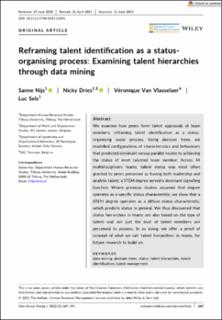Reframing talent identification as a status-organising process: Examining talent hierarchies through data mining
Journal article, Peer reviewed
Published version
Permanent lenke
https://hdl.handle.net/11250/2838125Utgivelsesdato
2021Metadata
Vis full innførselSamlinger
- Scientific articles [2181]
Sammendrag
We examine how peers form talent appraisals of team members, reframing talent identification as a status-organising social process. Using decision trees, we modelled configurations of characteristics and behaviours that predicted dominant versus parallel routes to achieving the status of most talented team member. Across 44 multidisciplinary teams, talent status was most often granted to peers perceived as having both leadership and analytic talent; a STEM degree served a dominant signalling function. Where previous studies assumed that degree operates as a specific status characteristic, we show that a STEM degree operates as a diffuse status characteristic, which predicts status in general. We thus discovered that status hierarchies in teams are also based on the type of talent—and not just the level of talent—members are perceived to possess. In so doing, we offer a proof of concept of what we call ‘talent hierarchies’ in teams, for future research to build on.

